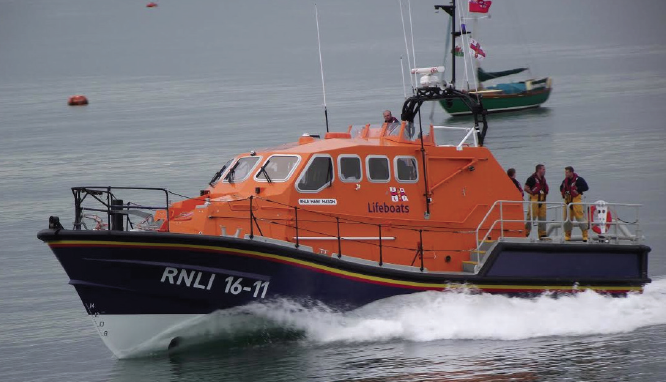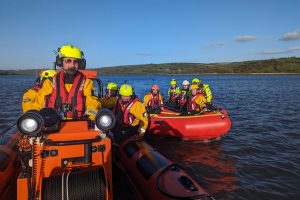
THE ROYAL NATIONAL LIFEBOAT Institution (RNLI), who save lives in Carmarthenshire, Pembrokeshire and Ceredigion, has revealed their phenomenal rescue statistics for 2015.
The report shows that the charity’s lifeboats launched 1,058 times and rescued 1,029 people.
RNLI lifeguards in Wales also had another busy summer in 2015, responding to 815 incidents and assisting 901 people on 32 beaches.
Angle was the second busiest all-weather lifeboat in Wales, with 38 lifeboat launches. The number of people rescued by the station’s inshore and all-weather lifeboat rose from 44 in 2014 to 53 in 2015. The volunteer RNLI crew also saved more lives than anywhere else in Wales, with eight people who would have otherwise lost their lives, being brought to safety.
At the seven RNLI lifeboat stations in west Wales between New Quay and Tenby, there were a total of 244 launches and 202 people rescued.
Tenby was the fourth busiest of the 30 lifeboat stations in Wales, with 55 launches and 52 people rescued. Fishguard saw a slight increase in call-outs with 26 launches in 2014 to 32 in 2015.
Launches were up on the up at Little and Broad Haven, with 23 launches and 23 people rescued in 2015, compared with 17 launches and 14 people rescued in 2014.
Nationally, during 2015 volunteer lifeboat crews rescued 7,973 people whilst the charity’s lifeguards rescued 1,790 people around UK and Irish coastal waters.
Despite a small decline in the number of incident compared with 2014, RNLI volunteers from a number of Welsh stations were kept exceptionally busy due to their roles with the charity’s Flood Rescue Team. Rising flood waters saw a number of deployments throughout December, with much activity focused around Cockermouth, Cumbria and Carlisle. Welsh volunteers with specialist swift water rescue training joined colleagues from across the UK, assisting 337 people and rescuing 74 people in distress.
Nicola Davies, Community Incident Reduction Manager for the RNLI said: “Our volunteer lifeboat crew and lifeguards have again worked exceptionally hard serving our local communities.
“We continue to urge those working or enjoying our coastline and inland areas to respect the water. Inland, floods caused heartache for many at the end of 2015 and we ask those faced with floods to be aware of the fast flowing flood waters and to keep a safe distance.
“We understand that things can go wrong from time, so some preventative maintenance and annual checks prior to the boating season should allow for worry free sea time.
“We would like to thank all of our volunteers for their tireless hard work and dedication overthe last 12 months, without all of our volunteers, fundraisers, education teams our lifesaving service would not operate.”
The volunteer lifeboat crews carry pagers 24/7, never knowing what may lay ahead when the alarm is raised. The most frequent type of call out was to bring people ashore, with 261 incidents of this nature in 2015 – the highest since 2011. This is followed closely by call outs to people in power pleasure craft (206 incidents) and then sail pleasure craft (196).
The most common cause of service was machinery failure, with 206 call outs in 2015.
Lifeguards provided a safety service on beaches in Ceredigion, Pembrokeshire, Carmarthenshire, Swansea, Neath Port Talbot and the Vale of Glamorgan last year, giving safety advice and assistance to beach goers.
Phil Davies, RNLI Lifeguard Manager for west Wales, said: “Much of the RNLI’s focus goes into preventing incidents before they occur, both lifeguards issuing safety advice on the beach and the charity’s safety and education work in communities. Our lifeguards dealt with fewer incidents last year compared to 2014 and while the inconsistent weather played a part, this shows the prevention work is having an impact.
“Some of the more serious incidents last year were where people got into difficulty trying to rescue others in trouble in the sea. We would always advise people to swim at lifeguarded beaches and report anyone in trouble to lifeguards, who are fully trained in how to deal with emergency situations. If lifeguards are not available call 999 and ask for the coastguard.”
With the RNLI’s services in more demand than ever, the RNLI is highlighting how support from the public is more vital than ever. Last year, the RNLI became first major UK charity to announce a fundamental change to the way it contacts people. From January 1 2017, it will only contact individuals who have expressly given their permission to contact them. In light of the new ‘opt in’ system, where individuals chose to be contacted, the RNLI says public support is more vital than ever.
Dave Page, RNLI Community Lifesaving Delivery Manager, added: “It’s humbling to see the lifesaving work of our volunteer crew, lifeguards, flood rescue teams and safety advisers. And now the RNLI as a whole owes it to them to act with integrity and tenacity as we take this step to opt-in communications from January 2017.
“So I’m appealing to all our dedicated supporters to help us by ticking our opt-in box over the next few months – to hear about our rescues, our safety advice, and our events and help us save the lives of hundreds more in the years to come.”
Look out for the RNLI’s future opt-in campaigns, or call our Supporter Care team on 0300 300 9918 (UK) or 0044 1202 663234 (non-UK) on weekdays between 8am and 6pm. Alternatively, contact the team by e-mail at [email protected] quoting your supporter number.


















Add Comment